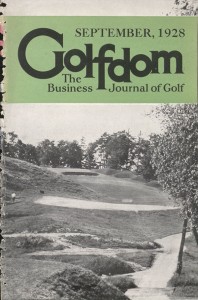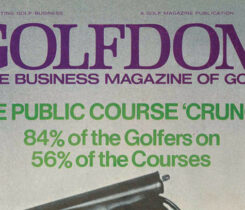The Golfdom Files Extended: Fire him? No!
 Better appraise the kicks on the greenkeeper’s work
Better appraise the kicks on the greenkeeper’s work
By Lawrence S. Dickinson // Massachusetts Agricultural College
Note: This article originally appeared in the September, 1928 issue of Golfdom
I had just finished a good round of golf. It was a fine foursome, evenly matched, jolly, all “broke a hundred;” a good score for us. No one had lost any money, none had been bet, and only a reasonable number of balls were lost. We had had REAL FUN.
While resting a while on the veranda of the club house a number of players went by me and the pro was conspicuously audible. During the twenty minutes I sat there I heard the phrase, “Get a new greenkeeper,” twelve times, four by the pro.
The greenkeeper seemed to me to be an able, honest, very hard working man of the type that makes greenkeeping a profession. The phrase, “Get a new greenkeeper,” worried me, for I knew he was a whole lot better than any one we could get, even if we paid a much larger salary.
In disgust I left the piazza and went to the locker room, then to the clubroom. The phrase, “Get a new greenkeeper,” was repeated several times in each place. And the whole golf course, according to the vociferous “crabs” had already gone to such rack and ruin that it ought to be cut up into building lots.
As the “crabs” came in I wrote their names on a pad, adding my piazza friends to the list. With the list of “crabs,” my knowledge of the club affairs, the greenkeeper, and turf, as basic data I began to make a study of the situation. The time was the last week of July, (the episode was repeated in early September) the season had been wet, the days were hot and the humidity high. The results of this study follow:
Analyzes the Kicks
The first name on the list was John A. Lawyer — big, husky chap, college football hero, past chairman of the Green Committee. John’s particular complaint that day was of the fairways. Grass was too long, had been so all the season. “Get a new greenkeeper.” Now I know that John drives a low ball, depending upon the roll fro distance. His opponent was “hitting them high” and making 25 or more yards better than John on a drive. John lost the match and was thoughtlessly charged it to the greenkeeper because of the tall grass. The greenkeeper has only one tractor, that badly worn; five cutting units, two of them as reserve units. It had rained hard at least four times a week since early May. The grass has grown very thick and very fast, necessitating fairway mowing twice a week everywhere, and in some places three times. The tournament committee has had three big matches, each of three days’ duration, and after 2:30 p.m. the traffic is too thick to permit mowing all of which is to be done with one unreliable three-unit tractor mower. John’s local prestige, size and voice have much influence in the club’s affairs. “Get a new Greenkeeper?” — NO! another tractor.
Number two on the pad was “Scotty,” the pro. “Get a new greenkeeper and get him quick.” “Scotty” had played a match with a visiting pro and lost twenty-five dollars. His excuses were interesting and all aimed at the greenkeeper. The prize one was this: “This old nine holes seeded greens and the new nine holes have stolon greens.” The sixty percent of the members who play golf for fun think those stolon greens are wonderful. They are well kept, clean and a putt runs very true. “Scotty” lost on those stolon greens because there were “no weeds or patches to line up my putts with.” Can you beat that? That was only one reason why “Scotty” wanted a new greenkeeper. “Scotty” has a number of hero worshipers and his morale is contagious.
Unfair Comparison
The third man on the list was Thomas Playabout. Always comparing our course with Blank course. Tom lost his match because his driving had been off. “It’s the tees. I can’t get a good stance; markers are not changed often enough, why at Blank course they have wonderful tees; their greenkeeper sure knows how to take care of them. Drove a lot better up there yesterday.”
Yesterday Tom had had an easy day at the office. The tees at the Blank course are all elevated and large. Our tees are the new style, flat. Tom feels better driving off of a mound, and our tees are worn more than the Blank tees because our traffic is five times as great as theirs. Tom also had a bad day at the office. “Stenographer sick and couldn’t find any thing.” Fire the greenkeeper on the strength of Tom’s argument? NO! Yet, Tom’s comparisons have their effect. There ought to be a twenty-five dollar fine imposed upon all golfers who criticize one course when comparing it with another, and ten dollars for even making a comparison. If one must make comparisons, compare your own course as it is with what it was, but make this comparison after taking into consideration weather, traffic, and money expended and then see if you need “a new greenkeeper.” Usually, the answer is “NO,” give him more pay.
Damned if They Do or Don’t
Skipping a few names I came to Herman A. Crank, a college professor (dead languages), who concentrates one minute before each stroke. I felt a bit sorry for Herman because he lost his match on the eleventh fairway. Herman was concentrating on a brassie shot. The tractor was “put, putting” very regularly 70 yards off to the side. The tractor driver, seeing Herman trying to play, courteously, as he thought, stopped the engine just as the stroke was about to be made. “The cessation of that “put, put” caused me to lose my stance and mental stability, and I flubbed the shot. The confounded greenkeeper ought to be fired for permitting his men to do things like that.” (The next player would have kicked if the tractor had not stopped.) “I think it was that fool workman on the sixth that made me go into the rough,” says Fred. “Bill thinks of a similar case and so it goes.” “Get a new greenkeeper?” NO! not because his men try to be courteous, or sometimes fail to do what is psychologically correct.
Golfers, do you realize the amount of labor time you cause to be wasted by holding the workmen while you play? You pay for it in money, and do not feel it. The greenkeeper pays for it in results and feels it very heavily.
Rough on the Rough
The fifth name I selected from the list was Alla Bye. Alla had just finished an important match with Samuel Slicer. Alla lost because the rough on the 12th, 14th, and 16th holes “was too good.” Almost like a fairway, “greenkeeper ought to know enough to let it be rough.” You see, Slicer was able to win these three holes, because the rough didn’t handicap him. A very pertinent question arises. Should the rough be alike as far as possible on all holes? Of course not. As a matter of fact the particular roughs referred to are very badly infested with weds. The greenkeeper by keeping them cut close is driving out the weeds, and destroying now and for the future a source of weed contamination on fairway and green. “Get a new greenkeeper?” NO! not yet.
The tenth name on the pad was Wood B. Champion, club medalist, nearly good enough to qualify for national championships, poor loser, every hole should be built and maintained so he can better his game. Wood lost his match because everything was wrong. “Greens full of crab grass.” “Traps full of foot prints.” “Seventh green all heel marks.” “The new green doesn’t slope enough,” and a lot more troubles. “Get a new greenkeeper, one that knows how to take care of a golf course.” Sure there is crab grass on the greens. This is the season of the year that crab grass thrives and is noticeable and crab grass almost invariably follows annual blue grass. Wood had made some fine scores on annual blue grass greens in the southern mountains and had persuaded the club to seed over some of the greens with it against advice of the greenkeeper. Wood wears spiked shoes. These spikes open holes in the turf into which drop seeds from his or another’s shoes and clothes. Traps were raked in the morning, but a thoughtless foursome ahead of Wood had failed to cover their tracks. On the seventh the greenkeeper had asked that this hole be better drained, or put out of play in wet weather, also Jones had his wife walking around the course with him and she “forgot and walked on the green in her high heels.” The new green was built exactly to the specifications of the best golf architect in the country, but it doesn’t “fit” Wood’s game. “Get a new greenkeeper?” NO! Correct the offenders.
The last entry on the pad said “Joe” Smith. Just returned from a month’s vacation at a “nice summer course.” Played regularly around eighty, here he can’t do better than ninety. “The course is rotten. Get a new greenkeeper.” “Joe” forgets that it is good business for summer courses to be low score courses, it helps the mental vacation to better one’s score. Furthermore, the summer course has eight months to recover from four months’ traffic which is no heavier than our normal traffic for eight months. The greenkeeper; is he fired yet?
The list of twenty or more names of the “crabby” players could be gone over in detail, but their complaints would be as varied and groundless as the few mentioned, and none of them would offer real, practical, constructive suggestions.
The Silent, Satisfied Majority
Nothing has been said about the sixty or sixty-five percent of the members who joined the club for its recreational and social advantages. If they lose a ball, a stroke or even a match game, it is “all in the game” and they lose no sleep, temper, or money over it. To these members the greenkeeper is most satisfactory, and the course is improving each year. Unfortunately they remain silent, seldom tell the greenkeeper how much they appreciate his work, and even fewer times let it be known to the green-committee that they are satisfied. Shall the club be ruled by a noisy and selfish minority and “get a new greenkeeper?”
The greenkeeper has to suffer for the bets that are lost, the bad days at the office, the present trend to make and maintain golf courses for a few low scorers, individual carelessness by a few members, bad digestions, and many other player troubles. Such is “all in the game” for the greenkeeper. I suppose, yet sometimes they cost him his position, and possibility for advancement in his profession. Is it fair to the greenkeeper? Is it fair to the game?
“Get a new greenkeeper.” Yes! If the course does not show physical improvement from year to year, in proportion to the money expended, the weather, traffic, age of equipment and the greenkeeper’s own professional improvement. NO! absolutely no, if the reason is that because every tree, fairway, green and all the rough is not suited to our particular type of golf, digestion, etc.










